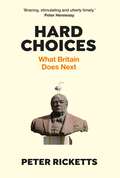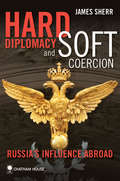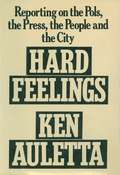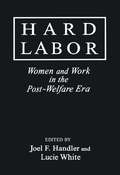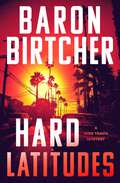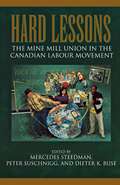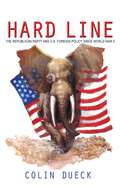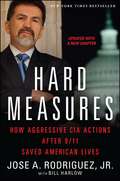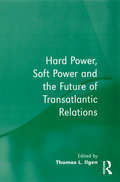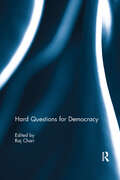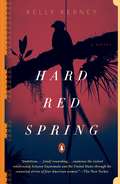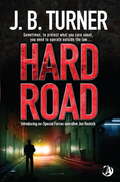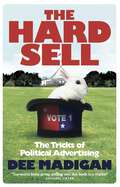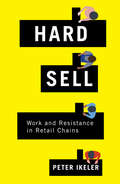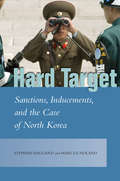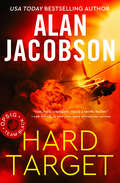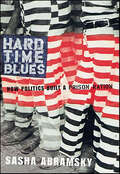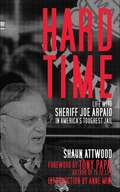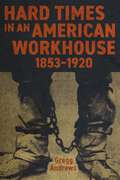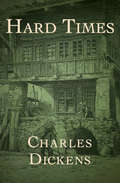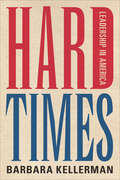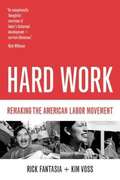- Table View
- List View
Hard Choices: What Britain Does Next
by Peter RickettsA groundbreaking exploration of the difficult decisions Britain faces outside the EU in a fast-changing world.After decades of peace and prosperity, the international order put in place after World War II is rapidly coming to an end. Disastrous foreign wars, global recession, the meteoric rise of China and India and the COVID pandemic have undermined the power of the West's international institutions and unleashed the forces of nationalism and protectionism.In this lucid and groundbreaking analysis, one of Britain's most experienced senior diplomats highlights the key dilemmas Britain faces, from trade to security, arguing that international co-operation and solidarity are the surest ways to prosper in a world more dangerous than ever.
Hard Diplomacy and Soft Coercion
by James SherrDuring the Cold War, Soviet influence and Leninist ideology were inseparable. But the collapse of both systems threw Russian influence into limbo. In this book, James Sherr draws on his in-depth study of the country over many years to explain and analyse the factors that have brought Russian influence back into play. Today, Tsarist, Soviet and contemporary approaches combine in creative and discordant ways. The result is a policy based on a mixture of strategy, improvisation and habit. The novelty of this policy and its apparent successes pose possible dangers for Russia's neighbours, the West and Russia itself.
Hard Feelings: Reporting on Pols, the Press, People and New York
by Ken AulettaKen Auletta's memoir about his time as a reporter.
Hard Interests, Soft Illusions: Southeast Asia and American Power
by Natasha Hamilton-HartIn Hard Interests, Soft Illusions, Natasha Hamilton-Hart explores the belief held by foreign policy elites in much of Southeast Asia-Indonesia, Malaysia, the Philippines, Thailand, Singapore, and Vietnam-that the United States is a relatively benign power. She argues that this belief is an important factor underpinning U.S. preeminence in the region, because beliefs inform specific foreign policy decisions and form the basis for broad orientations of alignment, opposition, or nonalignment. Such foundational beliefs, however, do not simply reflect objective facts and reasoning processes. Hamilton-Hart argues that they are driven by both interests-in this case the political and economic interests of ruling groups in Southeast Asia-and illusions.Hamilton-Hart shows how the information landscape and standards of professional expertise within the foreign policy communities of Southeast Asia shape beliefs about the United States. These opinions frequently rest on deeply biased understandings of national history that dominate perceptions of the past and underlie strategic assessments of the present and future. Members of the foreign policy community rarely engage in probabilistic reasoning or effortful knowledge-testing strategies. This does not mean, she emphasizes, that the beliefs are insincere or merely instrumental rationalizations. Rather, cognitive and affective biases in the ways humans access and use information mean that interests influence beliefs; how they do so depends on available information, the social organization and practices of a professional sphere, and prevailing standards for generating knowledge.
Hard Labor
by Joel F. Handler Jay D WhiteAn in-depth view of the world of low-wage women workers, this expert presentation by authors actively involved in the field provides a realistic picture of the women and the issues as well as suggested strategies and innovations. The book covers a wide range of topics, including getting and keeping a job, struggling to balance the demands of work and family, health care, child care, and unemployment. It is set in the context of both welfare reform and the low-wage labor market and incorporates both self-employment and micro-business enterprise.
Hard Latitudes (The Mike Travis Mysteries)
by Baron Birtcher&“[A] fast-paced mystery . . . Fans of the prolific Stuart Woods and Randy Wayne White will hope that Birtcher&’s engaging series has an equally long life.&” —Booklist A Nero Award Finalist After twenty years in the LAPD, Mike Travis should be enjoying his retirement in Hawaii. Instead, he&’s become a reluctant PI who can&’t manage to stay out of trouble—much to the chagrin of his long-suffering girlfriend. This time, the problem is his brother, Valden, head of the family company of Van de Groot Capital. A mover and shaker, he&’s in Los Angeles for a political fundraiser at the home of a powerful pharmaceutical titan. But first, he&’s being blackmailed. Someone has a compromising video of him and a young woman who is definitely not his wife—and they want three million dollars for it. That&’s when he calls Travis. With his longtime connections in Los Angeles—including his former partner on the force—Travis has everything under control, until he doesn&’t. Now entangled in a web of murder, finance, and politics, only Travis can unravel a conspiracy international in scope—and unparalleled in evil . . . &“Birtcher is a solid, fluent writer; the story unfolds with good-humored ease, and Travis is a personable narrator . . . All of the elements are in place for a tense thriller.&” —Kirkus Reviews &“Well-executed . . . Readers will hope they don&’t have to wait another seven years for the world-weary Travis&’s next adventure.&” —Publishers Weekly &“A thrilling page turner with a very complicated plot that all comes together in the end . . . Highly recommended.&” —Detective Mystery Stories
Hard Lessons: The Mine Mill Union in the Canadian Labour Movement
by Mercedes Steedman Dieter K. Buse Peter SuschniggThis book emerges from the papers, panels, and discussion of the conference "Where the Past Meets the Future - the Place of Alternative Unions in the Canadian Labour Movement," held to commemorate the first one hundred years of the history of the Mine, Mill and Smelter Workers Union. The union, which began in 1893 as the Western Federation of Miners and grew to a membership of over one hundred thousand in fifty locals throughout Canada during the 1950s, had shrunk to a single local of sixteen hundred members in Sudbury, Ontario, by the 1990s. This book brings together the voices of contemporary labour leaders, activists, old timers, and academics.
Hard Line: The Republican Party and U.S. Foreign Policy since World War II
by Colin DueckRepublican foreign policy and the conservative leaders who shaped itHard Line traces the history of Republican Party foreign policy since World War II by focusing on the conservative leaders who shaped it. Colin Dueck closely examines the political careers and foreign-policy legacies of Robert Taft, Dwight Eisenhower, Barry Goldwater, Richard Nixon, Henry Kissinger, Ronald Reagan, George H. W. Bush, and George W. Bush. He shows how Republicans shifted away from isolationism in the years leading up to World War II and oscillated between realism and idealism during and after the cold war. Yet despite these changes, Dueck argues, conservative foreign policy has been characterized by a hawkish and intense American nationalism, and presidential leadership has been the driving force behind it.What does the future hold for Republican foreign policy? Hard Line demonstrates that the answer depends on who becomes the next Republican president. Dueck challenges the popular notion that Republican foreign policy today is beholden to economic interests or neoconservative intellectuals. He shows how Republican presidents have been granted remarkably wide leeway to define their party's foreign policy in the past, and how the future of conservative foreign policy will depend on whether the next Republican president exercises the prudence, pragmatism, and care needed to implement hawkish foreign policies skillfully and successfully. Hard Line reveals how most Republican presidents since World War II have done just that, and how their accomplishments can help guide future conservative presidents.
Hard Measures
by Bill Harlow Jose A. Rodriguez Jr.While the American public is aware of the CIA's use of highly controversial "enhanced interrogation techniques," few know the man who, in the wake of September 11, led all U.S. counterterrorism operations and oversaw the use of those procedures--procedures that obtained vital and timely intelligence and helped safeguard the nation from future attacks. Puerto Rican-born Jose A. Rodriguez, Jr., served the United States for twenty-five years as an undercover officer before bringing his wealth of field knowledge to the CIA's Counterterrorism Center; now, in this riveting account and fascinating life story, one of America's top undercover operatives reveals how hard measures have derailed terrorist activity targeting the U.S., and saved countless American lives. Fully disclosed here for the first time are the undercover operations and tactics implemented during the George W. Bush presidency--which were approved by the highest levels of the U.S. government, certified as legal by the Department of Justice, and supported by bipartisan leadership of congressional intelligence oversight committees. But as the shock of 9/11 faded, the support that the intelligence community enjoyed and deserved gave way to shortsighted and potentially dangerous political correctness. One by one, the tools needed to successfully fight terrorism were banished, and the men and women who volunteered to carry out our nation's orders in combating al-Qa'ida found themselves second-guessed, hamstrung, and investigated-- including Rodriguez himself. In effect, the United States has chosen to willfully and unilaterally disarm itself in the war on terror. In Hard Measures, Rodriguez convincingly argues for the techniques used, and uncompromisingly details when these techniques were necessary, why they worked, and how, ultimately, they contributed to the capture of the world's most-wanted terror operatives, including Usama bin Ladin. From law school student to CIA recruit to his role as America's top spy, Rodriguez's full story is one of utmost importance--a rare, insider's look at an issue that demands attention. Above all, it's a reasoned, imperative, and fully informed case for hard measures, and an explosive and gripping account of the real war on terror-- where it's been and where it's headed. *** Terrorism has always been one of the toughest targets on which to collect intelligence. The secrets you want to steal frequently don't reside in computer systems, which can be hacked, or safes, which can be broken into, but in the inner recesses of a handful of individuals' minds. The cliché about intelligence work is that it is like working on a thousand-piece jigsaw puzzle but not having the box top to show you what the finished picture should look like. If only it were that easy. In fact, it is more like working on a million-piece puzzle with no box top, and having millions more random pieces that look like they might fit, but actually are from different puzzles altogether. It fell to us to make sense of the countless fragments of information and to take action on the chunks of the puzzle, which represented a real and growing threat to the United States and our allies. --from Hard Measures
Hard Power, Soft Power and the Future of Transatlantic Relations
by Thomas L. IlgenThe dynamics of transatlantic relations in the twenty-first century have been shaped by an American preference for the exercise of its considerable 'hard power' capabilities while Europeans have preferred to draw upon the considerable 'soft power' resources that have grown from their enviable internal processes of integration. These diverging power preferences have differential impacts on the management of Atlantic security, economic, and social and cultural relations. The contributors, long-time observers and analysts of the Atlantic partnership, debate how problematic security relations are likely to continue to be, discuss how successfully economic affairs will be managed, and examine the continuing frictions in domestic politics of social and cultural matters that should be manageable if both European and American leaders work actively and responsibly to encourage policy convergence.
Hard Pressed in the Heartland
by Peter RachleffA social history of the labor movement and Hormel strike
Hard Questions for Democracy
by Raj ChariThe recent financial and economic crisis has forced governments and people from around the globe to ask some hard questions about how democracy has evolved. Some of these are old questions; others are new. Is democracy really the most desirable form of government? How democratic is policy-making during the financial and economic crisis? Why do vote-seeking parties in modern democracies actually make voters miserable? Can women’s under-representation in politics be explained because of voter bias? Why are some citizens still excluded from voting in their country? And can terrorist organizations that promote violence one day, really become democratic the next?This represents the first book of its kind to ask and answer a broad range of hard questions that need to be addressed in times of both flux and calls for democratic change throughout the world. It does so by bringing together leading social scientists and rising stars from around the globe. Interdisciplinary in its analysis, it is essential reading for students of comparative and international politics, political philosophy, gender studies and economics. The book's website can be found at: www.democracyquestions.com and it was originally published as a special issue of Irish Political Studies.
Hard Red Spring
by Kelly KerneyAn ambitious and unforgettable epic novel that spans a hundred years of Guatemala's tumultuous history as experienced by four American women who are linked by the mysterious disappearance of a little girl In 1902, a young girl watches her family's life destroyed by corrupt officials and inscrutable natives. In 1954, the wife of the American ambassador becomes trapped in the intrigue of a cold war love affair. In 1983, an evangelical missionary discovers that the Good News may not be good news at all to the Mayan refugees she hopes to save. And in 1999, the mother of an adopted Mayan daughter embarks on a Roots Tour only to find that the history she seeks is not safely in the past. Kelly Kerney's novel tells a powerful story that draws on the history of Guatemala and the legacy of American intervention to vividly evoke The Land of Eternal Spring in all its promise and all its devastating failures. This is a place where a volcano erupts and the government sends a band to drown out the sound of destruction; where a government decree reverses the direction of one-way streets; a president decides that Pat Robertson and Jesus will save the country; and where a UN commission is needed to determine the truth. A heartrending and masterfully written look at a country in perpetual turmoil, Hard Red Spring brilliantly reveals how the brutal realities of history play out in the lives of individuals and reveals Guatemala in a manner reminiscent of the groundbreaking memoir I, Rigoberta Menchu.
Hard Road
by J. B. TurnerThe first in a series featuring Jon Reznick, covert assassin for the US Government. Since his wife died in the Twin Towers, Jon Reznick, a covert assassin for the US Government, has cared about nothing except his eleven-year-old daughter. But when he's ordered by his handler to kill a man in an exclusive Washington DC hotel, he discovers his intended victim is really a government scientist working on a secretive military project. Reznick is quickly ensnared in an extraordinary web of murder, extortion and double-crosses - and then his daughter's safety is threatened as well. But Jon isn't just up against the shadowy group who want the scientist eliminated. FBI chief Martha Meyerstein wants Reznick captured as well. And soon both Reznick and Meyerstein find themselves in the middle of a terrifying plot by a foreign government to launch a bio-terrorism strike against the United States.
Hard Sell: The tricks of political advertising
by Dee MadiganIn The Hard Sell, creative director Dee Madigan uses her trademark humour and down-to-earth approach to unveil the world of political advertising. Drawing on real-life stories from her own recent Federal and State campaigns, she gives us fascinating industry insight into:• How political ads are designed to work;• Who are they designed to work on; • How we pay for them; • Why we make so many negative ads; • How personal is too personal; • How spin works, particularly in an election campaigns; • How to make messages cut through the cynicism; • How politicians use journos who use politicians who use journos; • The gendered nature of it all; • And finally, what happens when it all turns to sh*t!Dee is candid about the tricks of the trade and the lessons that can be learnt.
Hard Sell: Work and Resistance in Retail Chains
by Peter IkelerAlong with fast-food workers, retail workers are capturing the attention of the public and the media with the Fight for $15. Like fast-food workers, retail workers are underpaid, and fewer than 5 percent of them belong to unions. In Hard Sell, Peter Ikeler traces the low-wage, largely nonunion character of U.S. retail through the history and ultimate failure of twentieth-century retail unionism. He asks pivotal questions about twenty-first-century capitalism: Does the nature of retail work make collective action unlikely? Can working conditions improve in the absence of a union? Is worker consciousness changing in ways that might encourage or further inhibit organizing? Ikeler conducted interviews at New York City locations of two iconic department stores--Macy's and Target. Much of the book's narrative unfolds from the perspectives of these workers in America's most unequal city.When he speaks to workers, Ikeler finds that the Macy's organization displays an adversarial relationship between workers and managers and that Target is infused with a "teamwork" message that enfolds both parties. Macy's workers identify more with their jobs and are more opposed to management, yet Target workers show greater solidarity. Both groups, however, are largely unhappy with the pay and precariousness of their jobs. Combined with workplace-generated feelings of unity and resistance, these grievances provide promising inroads to organizing that could help take the struggle against inequality beyond symbolic action to real economic power.
Hard Target (An Alex Morgan Thriller)
by Leo J. MaloneyIn this fast-paced, super-charged new thriller series from real-life Black Ops veteran Leo J. Maloney, Alex Morgan, daughter of legendary operative Dan Morgan, comes into her own as an agent to be reckoned with . . .HARD TARGET With reports of an imminent terrorist attack in Chicago during a speech by the Vice President, Zeta Division is on high alert. Working with the F.B.I. and the Secret Service, headquarters sends Alex Morgan to lead a tactical team. But when they barely escape the explosion of a large bomb, the danger only amps up, along with the death toll. Now a primary suspect, Alex gets a simple message from Zeta: RUN. It&’s just the beginning of a harrowing cross country journey in which Alex will race to stop an attack on the largest uranium storage facility in the U.S., even as she&’s chased by both police and terrorists. While Zeta and Dan Morgan himself work frantically to gather reinforcements, Alex finds help from unlikely sources—one much closer home and with far more complex, and personal motives than she can imagine. But only one thing is clear: this is a fight Alex can&’t win alone. Praise for Leo J. Maloney and His Novels &“Fine writing and real insider knowledge.&” —Lee Child &“Rings with authenticity.&” —John Gilstrap &“Everything a thriller reader wants.&”—Ben Coes &“The new master of the modern spy game.&”—Mark Sullivan &“A ripping story!&” —Meg Gardiner
Hard Target: Sanctions, Inducements, and the Case of North Korea
by Stephan Haggard Marcus NolandBecause authoritarian regimes like North Korea can impose the costs of sanctions on their citizens, these regimes constitute "hard targets." Yet authoritarian regimes may also be immune—and even hostile—to economic inducements if such inducements imply reform and opening. This book captures the effects of sanctions and inducements on North Korea and provides a detailed reconstruction of the role of economic incentives in the bargaining around the country's nuclear program. Stephan Haggard and Marcus Noland draw on an array of evidence to show the reluctance of the North Korean leadership to weaken its grip on foreign economic activity. They argue that inducements have limited effect on the regime, and instead urge policymakers to think in terms of gradual strategies. Hard Target connects economic statecraft to the marketization process to understand North Korea and addresses a larger debate over the merits and demerits of "engagement" with adversaries.
Hard Target: The Hunted, Hard Target, And The Lost Codex (OPSIG Team Black #2)
by Alan JacobsonAfter an assassination attempt on the president-elect, the OPSIG team is on the hunt in this &“terrific thriller&” from the USA Today–bestselling author (Lee Child).Hard Target by Alan Jacobson is a ticking time bomb that will keep you clinging to the edge of your seat . . . and turning the pages. An explosion pulverizes the president-elect&’s helicopter on election night. It soon becomes clear that the group behind the assassination attempt possesses far greater reach than the FBI Joint Terrorism Task Force has yet encountered—and a plot so deeply interwoven in the country&’s fabric that it threatens to upend America&’s political system.
Hard Time Blues: How Politics Built a Prison Nation
by Sasha AbramskyIn September 1996, fifty-three year old heroin addict Billy Ochoa was sentenced to 326 years in prison. His crime: committing $2100 worth of welfare fraud. Ochoa was sent to New Folsom supermax prison, joining thousands of other men who will spend the rest of their lives in California's teeming correctional facilities as a result of that state's tough Three Strikes law. His incarceration will cost over $20,000 a year until he dies.Hard Time Blues weaves together the story of the growth of the American prison system over the past quarter century primarily through the story of Ochoa, a career criminal who grew up in the barrios of post-World War II L.A. Ochoa, who had a long history of non-violent crimes committed to fund his drug habit, who cycled in and out of prison since the late 1960's, is a perfect example of how perennial misfits, rather than blood-soaked violent criminals, make up the majority of America's prisoners. This is also the story of the burgeoning careers of politicians such as former California Governor Pete Wilson, who rose to power on the "crime issue." Wilson, whose grandfather was a cop murdered by drug-runners in early twentieth century Chicago, scored a stunning come-from-behind re-election victory in 1994. In so doing, he came to epitomize the 1990s tough-on-crime politician.Award-winning journalist Sasha Abramsky uses immersion reportage to bring alive the political forces that have led America's prison and jail population to increase more than four fold in the past twenty years. Through the stories of Ochoa, Wilson, and others, he explores in devastating detail how the public has been manipulated into supporting mass incarceration during a period when crime rates have been steadily falling. Hard Time Blues deftly explores the War on Drugs, the Rockefeller Laws, the growth of the SuperMax Prisons, the climate of fear that led to laws such as Truth-in-Sentencing, and how the stunning repercussions of imprisoning two million citizens affect all of America. In the tradition of J. Anthony Lukas's Common Ground and Melissa Fay Greene's The Temple Bombing, Abramsky explores this new and dangerous fault-line in American society in a dramatic and compelling manner. From the opening courtroom scene through the final images behind the electrified fences of the nation's toughest, meanest prisons, Abramsky paints a grimly intimate portrait of the players and personalities behind this societal earthquake. Hard Time Blues combines a sense of history with a powerful narrative, to tell a story about issues and people that leads us to understand how The Land of the Free has become the world's largest prison nation.
Hard Time: Life with Sheriff Joe Arpaio in America?s Toughest Jail (English Shaun Trilogy Ser. #Vol. 2)
by Anne Mini Tony Papa Shaun AttwoodShaun Attwood was a millionaire day trader in Phoenix, Arizona, but his hedonistic lifestyle of drugs and parties came to an abrupt end in 2002 when a SWAT team broke down his door. Attwood found himself on remand in Maricopa Jail with a $750,000 cash bond and all of his assets seized. The nightmare was only just beginning as he was submerged in a jail in which rival gangs vied for control, crystal meth was freely available, and where breaking rules could result in beatings or death. Sheriff Joe Arpaio’s jails have the highest death rate in the United States. Hard Time is the harrowing yet darkly humorous account of the time Attwood spent submerged in a nightmarish world of gang violence and insect-infested cells, eating food unfit for animals. His remarkable story provides a revealing glimpse into the tragedy, brutality, comedy, and eccentricity of prison life.
Hard Times in an American Workhouse, 1853–1920
by Gregg AndrewsHard Times in an American Workhouse, 1853–1920, is the first comprehensive examination of a workhouse in the United States, offering a critical history of the institution in the Gilded Age and Progressive Era. Using the Old St. Louis Workhouse as a representative example, award-winning historian Gregg Andrews brings to life individual stories of men and women sentenced to this debtors’ prison to break rocks in the quarry, sew clothing, scrub cell floors and walls, or toil in its brush factory. Most inmates, too poor to pay requisite fines, came through the city’s police courts on charges of vagrancy, drunkenness, disturbing the peace, or violating some other ordinance. The penal system criminalized everything from poverty and unemployment to homelessness and the mere fact of being Black. Workhouses proved overcrowded and inhospitable facilities that housed hardcore felons and young street toughs along with prostitutes, petty thieves, peace disturbers, political dissenters, “levee rats,” adulterers, and those who suffered from alcohol and drug addiction. Officials even funneled the elderly, the mentally disabled, and the physically infirm into the workhouse system.The torture of prisoners in the hellish chambers of the St. Louis Workhouse proved far worse than Charles Dickens’s portrayals of cruelty in the debtors’ prisons of Victorian England. The ordinance that created the St. Louis complex in 1843 banned corporal punishment, but shackles, chains, and the whipping post remained central to the institution’s attempts to impose discipline. Officers also banished more recalcitrant inmates to solitary confinement in the “bull pen,” where they subsisted on little more than bread and water. Andrews traces efforts by critics to reform the workhouse, a political plum in the game of petty ward patronage played by corrupt and capricious judges, jailers, and guards. The best opportunity for lasting change came during the Progressive Era, but the limited contours of progressivism in St. Louis thwarted reformers’ efforts. The defeat of a municipal bond issue in 1920 effectively ended plans to replace the urban industrial workhouse model with a more humane municipal farm system championed by Progressives.
Hard Times: And Other Stories
by Charles DickensCharles Dickens&’s moral tale of utilitarian values run amok The industrial burg of Coketown is dominated by the philosophy of utilitarianism. The mill is the center of commerce. Students in the school are instructed to recite rote facts and figures while repressing any creative instincts. Thomas Gradgrind, the school superintendent, is a strict devotee of practicality and has raised his children, Tom and Louisa, according to this philosophy. It is only Sissy Jupe, a circus girl taken in by the Gradgrinds, who possesses the vision and wonderment to see past the rigid boundaries of cold, hard facts. A paean to the human spirit, Hard Times is among Dickens&’s most cutting works of social commentary. This ebook has been professionally proofread to ensure accuracy and readability on all devices.
Hard Times: Leadership in America
by Barbara KellermanLeadership has never played a more prominent role in America's national discourse, and yet our opinions of leaders are at all-time lows. Private sector leaders are widely seen as greedy to the point of being corrupt. Public sector leaders are viewed as incompetent to the point of being inept. And, levels of trust in government have plummeted. As the title of this book conveys, leaders in America are experiencing hard times. Barbara Kellerman argues that we focus on leaders, and even on followers, while ignoring an essential element of leadership: context. This book is a corrective. It enables leaders to track the terrain that they must navigate in order to create change. Rather than a handy-dandy manual on what to do and how to do it, Hard Times is structured as a checklist. Twenty-four brief sections cover key aspects of the American landscape. They trace evolutions and revolutions that have revised our norms, transformed our populations and institutions, and shifted our culture. Kellerman's crash course on context reveals how significant it is to leadership. Clearer still is the fact that leadership is more difficult than it has ever been. It is context that explains why leadership is so fraught with frustration. And, it is context that makes evident why leadership will be better exercised if it is better understood. Calling out patterns that emerge from the checklist, Kellerman challenges leaders to do better. This fascinating read will change the way that all of us think about leadership, while compelling us to consider what it means for our future.
Hard Work: Remaking the American Labor Movement
by Rick Fantasia Kim VossThis concise overview of the labor movement in the United States focuses on why American workers have failed to develop the powerful unions that exist in other industrialized countries. Packed with valuable analysis and information, Hard Work explores historical perspectives, examines social and political policies, and brings us inside today's unions, providing an excellent introduction to labor in America.
